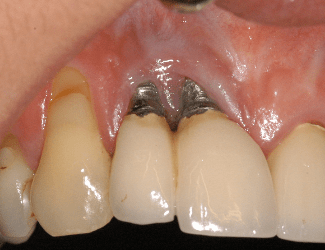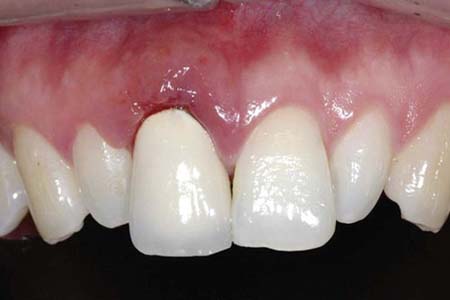
There are many reasons why not to get dental implants including nerve damage, sinus damage, infection and damage to other teeth. Also there are some alternatives to getting an implant. Implant problems are uncommon, but there are many other less than optimal negative outcomes. A good implant surgeon usually does not have negative outcomes, but they can happen.
No one wants to go without teeth. The sales pitch for replacing teeth for dental implants is not a difficult one. And yes, implants are great and there is reason for excitement and hype. But slow down, because there are many things that can go wrong with dental implant procedures:
- Peri-implantitis
- Jaw bone infection
- Bone loss around implants
- Implant rejection
- Allergy to titanium or zirconia

implant problem peri implantitis
Gary Adams DDS-25 years of Dental Implant experience

Contact Dr. Adams for a complimentary consultation or 2nd opinion
What is a dental implant?
It is an anchor of foreign material that is put down into your jaw to replace the root of a missing tooth. Think of it as a support system where new teeth can be connected. You can get one or you can get all your teeth replaced with implants.
But here is the important concept – The anchors are surgically put into living jawbone. After that, your bone cells need to do the rest. The bone cells need accept the anchor and grow new bone around and attach to the new implant. It is really that simple. The term for this is “osseointegration.” Literally integration/acceptance of the implant into your osseous/bone tissue. Implants are not screws that are put into jaws like screws go into wood. But rather, foreign elements your body needs to accept and not reject.
There is no magic. Implants do not work like car parts that are bolted together. The bone accepts or rejects the titanium or zirconia dental implant. Implants get accepted into your body and your tissue accepts it by growing bone around and connecting and healing to the implants.
Alternatives to Dental Implants
- Teeth Bridges-using existing teeth to support toot replacement.
- Removable Bridges aka Dentures.
In general dental implants are the best option to replace missing teeth.
Common Dental Implant Problems:
Peri-implantitis
Peri-implantitis is literally bone loss or inflammation around a dental implant. This term really means nothing other than you have some messed up tissue around an implant. But why is the tissue unhealthy and irritated is the question? Regardless of what causes this condition, it usually leads to implant failure and the need for implant removal and replacement.
Implant infection
Implant Infections can happen around implants for many reasons. Usually it will happen shortly after the implant is placed. If an implant gets infected it will usually lead to implant rejection. The problem is easy to correct as the implant will be loose and can be easily removed and later replaced. Infections around implants if left untreated can become serious and spread to other areas of your body. Healthy patients will usually heal with few complications after an infected implant is removed. You should not get a dental implant if you are not healthy. For example, if you have uncontrolled diabetes or if you have a compromised immune system.
Implant rejection
Implants are a foreign material placed into your body. Not everyone will accept the foreign material placed into their jaw. Implants are generally made of either titanium alloy (titanium mixed with other metals) or zirconia. Titanium is a metal that corrodes very slowing over time into titanium oxides. The titanium oxides leak out into jawbone and can cause the body to reject an implant. Titanium rejection secondary to corrosion will usually will happen years later since the corrosion process is slow. Newer titanium implants have special coatings on the surface to help the metal heal better and resist corrosion. Not all titanium implants are created equal. Zirconia implants do not corrode and may be a better choice for people who have sensitivities.
Dental Implant Allergies
Implants can experience immediate rejection in the event of allergies and sensitivities to titanium and zirconia. Allergies to the material itself can cause rejection. Material testing such as Melisa and Biocomatibility testing are available. The tests can determine if someone is reactive to zirconia or titanium. In general people are more likely to be reactive to titanium than zirconia, but reactivity to either is rare. Just remember, if you are sensitive you will be better off with a zirconia implant since you will be more likely to reject the titanium later years after it has been placed. Also just because you do not react today does not mean you will not react tomorrow. Allergies sometimes come after exposure to a material days or years later.
Implant Allergies can happen several years post implantation
Getting foreign materials placed into your body is a serious thing. And dental implants are no exception. In general, replacing teeth with implants is quite predictable. Many people have had titanium implants in their bodies for 10, 20 and 30 years without problems or rejection. But, but that is not always the case. Rejection can happen and there is no guarantee that you will not have problems. Don’t drink the cool aide and think you can buy new a new beautiful set of teeth the way you can buy a new care or kitchen.

dental implant allergy complication
Peri-Implantitis causes bone loss around Implants:
If you have bone loss around an implant, your body is rejecting the implant. The best treatment is to remove the implant to stop the immunological response, remove infection and prevent further bone loss.
Protocol for treating Peri-Implantitis
- Inject ozone O3 and oxygen O2. Ozone will neutralize any bacterial infection that has gotten into the bone around the area of peri-implantitis. It will also reduce some of the inflammation caused by the failing implant.
- Remove the Implant in it’s entirety being sure not to leave any small pieces of titanium or zirconia or dental instruments/debris. Often times implant fragments can be left behind if the procedure is not done carefully. Implant particles can be released into many small pieces and fall into the pores of the bone. Particles are foreign bodies and the goal is to remove the foreign material to restore bone health and terminate the immunological response.
- Remove cyst and granulation tissue from the implant extraction site. The body will often grow cysts in the areas of bone loss around the failing implant. If the cysts are not removed bacterial and fungal pathogens will remain vital in the extraction site. The cysts have their own blood supply and exchange nutrients and waste with blood supply and lymph.
- Place oxygen and ozone into the cleaned implant extraction site. The gases can easily travel through the pores of the bone, killing any infections and promoting healing. Bone lacks a lot of blood supply, so it is very susceptible to infection.
- Place PRF or platelet rich fibrin and completely fill the extraction socket. Do not place any foreign or off the shelf bone graft products. The body will more than likely reject the material and there will be further inflammation and immunological consequences.
- Place bone graft materials mixed in with the PRF if there are large areas of bone loss. It may also be necessary to place membranes to contain bone graft products and PRF.
- Place sutures to proximate as closely as possible any gum tissue that may be loose. The sutures can also act to hold the PRF into the extraction site.
- Allow 4 – 12 weeks of healing and re-evaluation the site for proper healing. Administer additional ozone if necessary. Placement of new implants can be considered at this time if there is no infection and adequate bone. If necessary, bone grafting and PRF treatments can be performed. Sometimes implants and grafting can be done at the same time.
- Repeat new Implant Surgery
New Implants have less Peri-Implantitis
More often the failed implants will be titanium (older ones). New safer implants should be placed. It is better to use zirconia or new titanium implants with improved and safer surfaces. A biocompatibility test to determine the most suitable material is also necessary. If you react to titanium material another titanium implant should not be placed.

 (301) 421 1996
(301) 421 1996 burtonsvillesmiles@gmail.com
burtonsvillesmiles@gmail.com